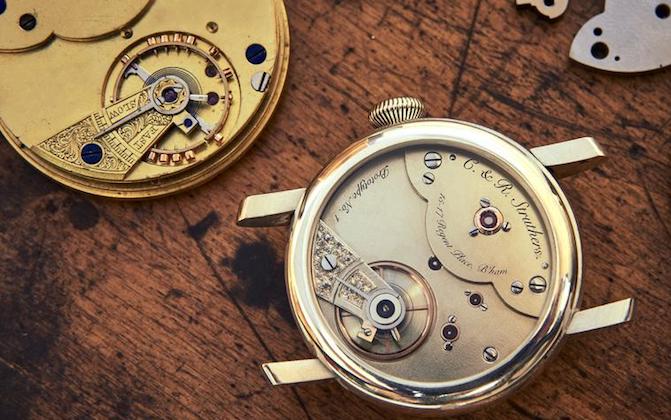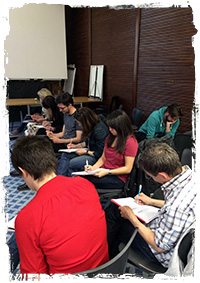Hi Rebecca, thank you for sharing your career story with us.
When did you complete your PhD and what School or disciplinary area was it in?
I completed in 2017, my supervision was based in Visual Communication at Parkside and my PhD is in horology.
What is the title of your PhD and can you sum up in a couple of sentences what it was about?
The title of my thesis is Unravelling the myth of the ‘Dutch forgery’: the production, trade, and dissemination of grey market watches in Europe, 1750-1820. It explores the emergence of mass-manufactured watches in C18th Europe evidenced via a combination of forensic analysis of surviving examples at the British Museum and archival research. The results brought the accepted date of mass-production in this context forward nearly 100 years.
What is your current job and what does it involve?
I’m the co-founding director of Struthers Watchmakers and a visiting lecturer at Birmingham City University. You have to be a bit of a chameleon to be self-employed. Primarily, I’m a watchmaker and practitioner, but I also manage our research and development, project and exhibition management, social media, website, accounts, marketing and even the odd bit of building renovation.
What are your career aspirations for the future?
Being my own boss already leaves me in my dream job so it’s more a question of growing my business to where I want it to be. Other than that, I would have liked to have a stronger research involvement but academic jobs are hard to secure. While it’s been a lot of hard work I feel lucky that I have something else to go to. If I’d relied entirely on securing a post-doctoral research position I’d feel pretty dejected by this stage. It’s something I will continue to pursue just in a more unconventional way.
How did you transition from your PhD to your current employment?
I ran my business full time around my full-time PhD. Although I’d managed to juggle the two it hadn’t allowed me the time to act on the ideas and projects that would move my workshop forwards so returning to these was a priority on completion. Around that, I started looking for a part-time academic role to keep my hand in. It took a year and a lot of hard work just to get a 0.2 fixed-term contract which is coming to an end soon.
Did you undertake any activities or training during your PhD to enhance your professional development and support your career goals?
Everything revolved around my research and my business. Fortunately, the two are in the same field so my theory was informing my practice and vice versa. It also left me the most qualified person in my industry in British history which was a great bit of PR. Authority in your field is one of the most valuable assets any business can have.
That aside, I completed a teaching qualification with the HEA and Community Organising Training with Citizens UK; both of which have been beneficial to my research practice and career development.
Has the PhD informed your current work / future plans and if so how?
Absolutely. My practice is based on heritage manufacturing techniques so understanding how something was made over two-hundred years ago allows me to recreate it in my own way in the twenty-first century. I also like to incorporate little nods to design in watches that I’ve handled and inspired me. The most important contribution has been the way it has informed my production process. The British watch industry died out in any meaningful way at the turn of the twentieth century and we have lost the network of allied craftspeople required to make many of the various components. Studying in detail how we worked as a collaborative community of makers in the past allows me to reform these networks. By working closely with those I have identified as having interdisciplinary skills we are bringing commercial production of components, such as enamel watch dials, back to the UK.
Looking back, what are your reflections on doing the PhD and do you consider it a worthwhile experience?
Yes, although if you’d asked me that after completion it would have been no. I had a massive wobble upon the realisation that I’d just spent a huge amount of time and money on qualifying myself for a job that didn’t exist. Being the first of something is a very lonely place to be. I thought it would make securing an academic job easier because it had attracted quite a lot of press and industry interest but that wasn’t the case at all. You’re basically relying on someone to give you a chance to demonstrate how cross-disciplinary your skills are because, realistically, it’s very unlikely that a recruiter is going have the time to read your thesis in advance and see that for themselves.
What are your top three tips to PhD students for developing a career after completion – either in your profession or more generally?
Firstly, don’t wait until submitting to start applying for jobs. Unless you’re very lucky it will take a while to get your first post, plus, the only way to get better at applying for academic jobs is to practice. Get feedback whereever possible and refine your applications. It will also get you thinking about your research and how to describe your work quickly and effectively which will come in handy at your viva.
Then, I’d say don’t expect opportunities to just land in your lap. If you want to succeed at something you have to be proactive about it. Don’t ask don’t get!
Finally, from my own experience and that of many of the post-docs I’ve spoken to, a post-PhD come down of some description is very normal. If you are finding it challenging make sure you speak to people, whether it’s staff, fellow students, your supervisors or your friends and family.
Thanks so much for your time Rebecca, we wish you all the best for the future!
Website: www.strutherswatchmakers.co.uk
Twitter: @DrStruthers
Instagram: @rebeccastruthers



